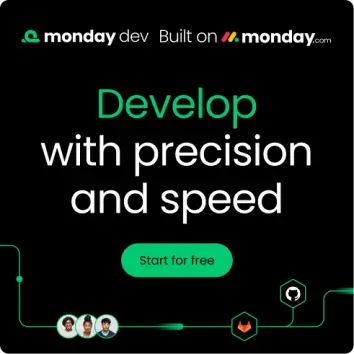ProductPlan stands out as one of the most trusted product management platforms, empowering companies to build thousands of visual roadmaps and plan millions of initiatives with its unique features and intuitive interface.
But whether you’re a startup looking for a cost-effective solution or an enterprise seeking advanced features, there are plenty of alternatives that offer comprehensive roadmapping, feedback collection, and strategic planning capabilities.
In this guide, we’ll compare ten well-known ProductPlan alternatives with a breakdown of their features, pros and cons, and pricing plans. From specialized product management tools focusing on customer feedback to flexible platforms like monday dev that connect strategy with execution, we’ll help you find the best platform for your product development needs.
Try monday devWhat is ProductPlan?
ProductPlan is a cloud-based product roadmap tool designed specifically for product managers and teams to create, communicate, and prioritize strategic roadmaps. Its intuitive drag-and-drop interface, collaboration tools, and integration capabilities enable product managers to develop visually compelling roadmaps that convey product strategy and priorities across teams and stakeholders.
Its key features include:
- Roadmap creation: Simple, intuitive, and visually appealing roadmap interfaces
- Customization: Multiple view options, including timeline, board, and grid formats
- Collaboration: Strong sharing and stakeholder communication tools
- Automation: Efficient progress tracking and status updates
- Integrations: Connects with tools like Jira, Trello, and Asana
In a nutshell, it’s an ideal solution for teams seeking to align their product vision and monitor progress efficiently without complex project tracking overheads.
Top 10 ProductPlan alternatives and competitors
While ProductPlan is an excellent platform for product management teams, it’s not the only option. Due to its potential high costs and limited integration options, you may want an alternative that offers more customer-centric product management features, such as connecting product strategies directly to customer feedback and providing comprehensive prioritization tools.
Below, we’ve gathered the ten best ProductPlan alternatives to consider when choosing your product management and software development solution.
Software Best for Standout feature Pricing
monday dev Teams looking for a flexible platform to manage the entire product development lifecycle Customizable product roadmap planning and sprint management Premium plans from $9/seat/month
Jira Teams working on complex development projects Comprehensive roadmap planning and sprint management tools Free plan available; premium plans from $7/user/month
Asana Teams looking for a flexible and collaborative project management solution Sprint planning and roadmap tools for agile product development Free plan available; premium plans from $10.99/user/month
Aha! Teams looking for an all-in-one product development lifecycle solution Visual roadmapping with customizable views and easy sharing options Premium plans from $59/user/month
ClickUp Teams looking for customizable features to manage the product lifecycle Product roadmapping with customizable views and timeline planning Free plan available; premium plans from $7/user/month
Productboard Teams looking for a centralized product management system Centralized user feedback management with validated insights Free plan available; premium plans from $19/maker/month
Craft.io Teams looking for a centralized product development system Strategic roadmapping with customizable views for different audiences Premium plans from $19/editor/month
airfocus Teams looking for a flexible and customizable product management solution Customizable prioritization frameworks with scoring matrices Premium plans from $59/editor/month
Airtable Teams looking for a flexible and customizable solution to manage their product lifecycle Customizable roadmapping with multiple views Free plan available; premium plans from $20/seat/month
Smartsheet Teams looking for a flexible and collaborative solution to manage development projects Multiple views for visualizing product timelines Premium plans from $9/member/month
1. monday dev
Best for: Software development teams, product managers, and cross-functional teams looking to manage the entire product development lifecycle in one flexible platform
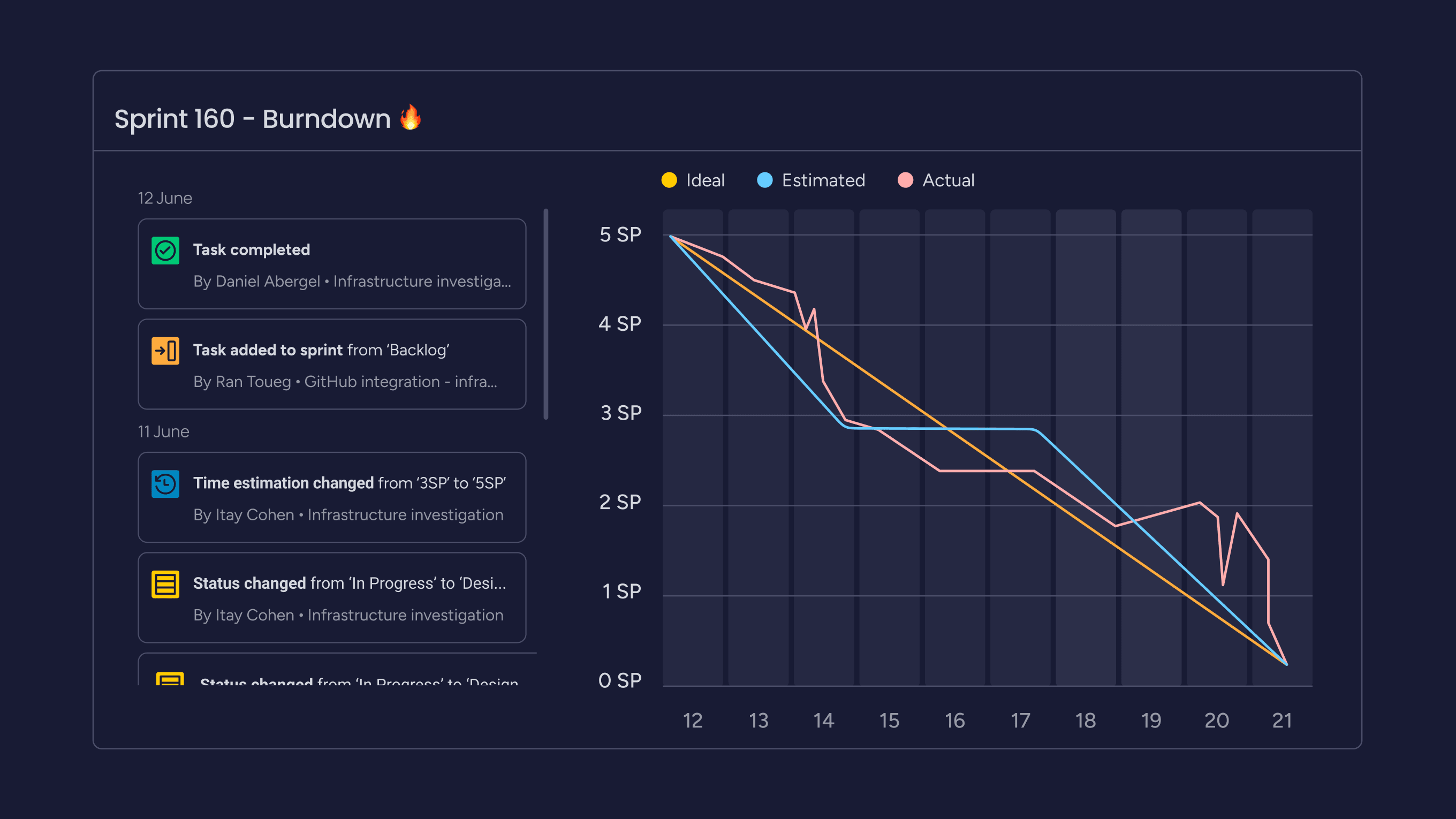
monday dev is a comprehensive product development management platform designed to connect developers, product designers, and business teams throughout the entire product lifecycle. It offers customizable features to help teams plan, execute, and collaborate effectively, bringing products to life faster.
Key features of monday dev
- Sprint management with burndown charts for tracking progress
- Git integration (GitHub, GitLab) for streamlined updates and status tracking
- Product roadmap planning and visualization tools
- Highly customizable workflows and views to fit specific team needs
- Robust integration capabilities with over 200 apps and tools
- Visual representation of tasks and progress through boards, cards, and timelines
monday dev pricing
- Basic: $9/seat/month (billed annually)
- Standard: $12/seat/month (billed annually)
- Pro: $20/seat/month (billed annually)
- Enterprise: Custom pricing
Read more about the monday dev plans and pricing.
monday dev ratings and reviews
Compare: monday.com vs. Jira, monday.com vs. ClickUp, monday.com vs. Asana, monday.com vs. Trello
Try monday dev2. Jira
Best for: Software development teams, product managers, and agile practitioners working on complex projects that require detailed tracking and team collaboration
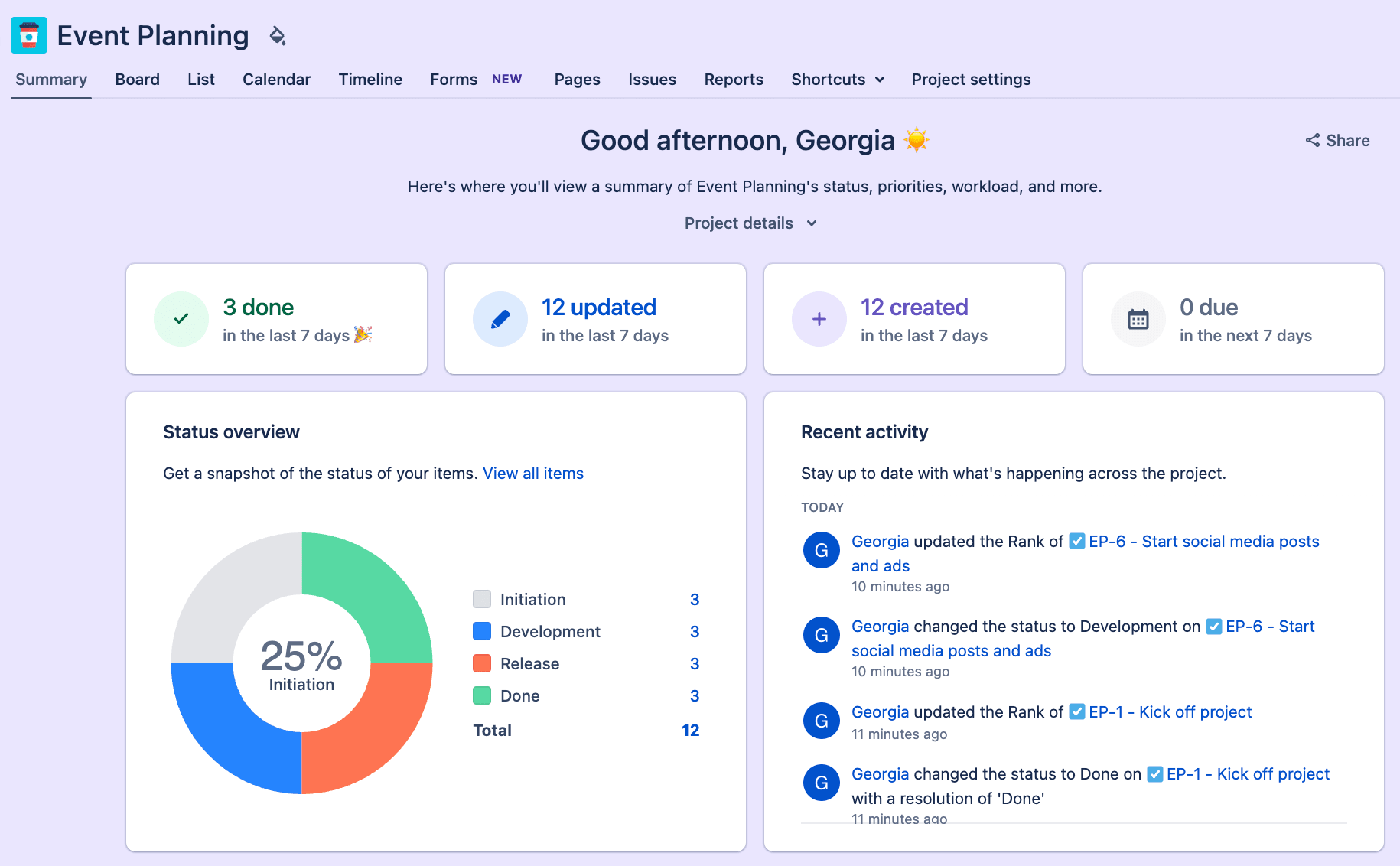
Jira is a versatile project management tool designed to help teams plan, track, and manage agile software development projects. It offers a wide range of features for product managers and development teams, enabling them to collaborate effectively and deliver high-quality products.
Key features of Jira
- Customizable Scrum and Kanban boards for visualizing workflow
- Comprehensive roadmap planning and sprint management tools
- Robust issue tracking and backlog management capabilities
- Highly customizable workflows and fields to fit specific team needs
- Extensive integration options with other development tools and platforms
- Powerful reporting and analytics for tracking project progress and team performance
Jira pricing
- Free: Up to 10 users
- Standard: $7.75/user/month
- Premium: $15.25/user/month
- Enterprise: Custom pricing
Read more about Jira’s plans and pricing.
Jira ratings and reviews
Compare: Jira vs. ClickUp, Jira vs. Asana, Jira vs. Basecamp, Jira vs. monday.com, Jira Alternatives
3. Asana
Best for: Cross-functional teams, product managers, and agile teams looking for a flexible and collaborative project management solution
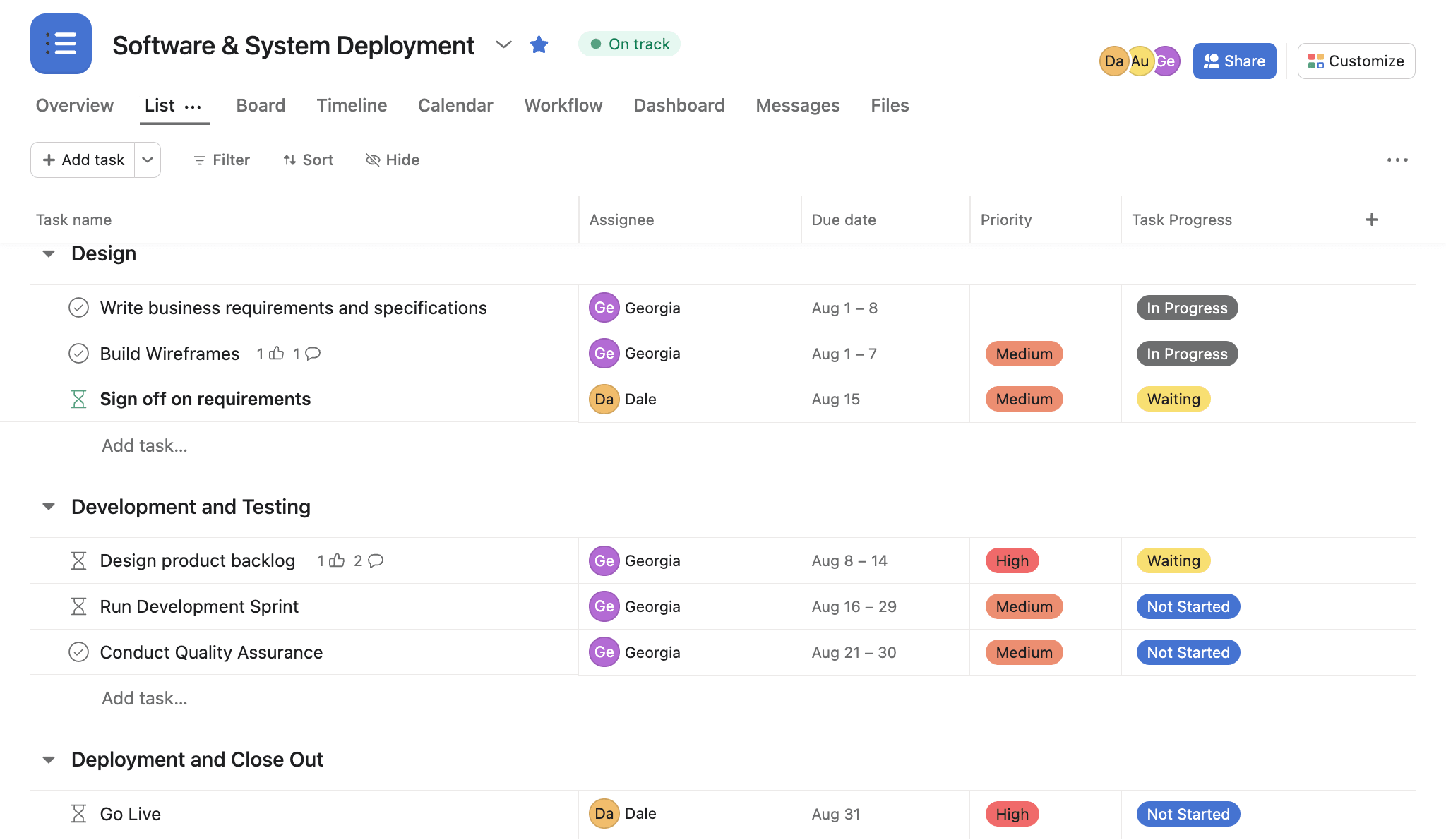
Asana is a versatile work management platform designed to help teams plan, organize, and execute projects efficiently. It offers a wide range of features for task management, project tracking, collaboration, and workflow automation, making it suitable for various team sizes and industries.
Key features of Asana
- Customizable workflows with Kanban boards, Gantt charts, and list views
- Sprint planning and roadmap tools for agile product development
- Automation capabilities for repetitive tasks and processes
- Highly intuitive user interface with drag-and-drop functionality
- Extensive integration options with popular development and productivity tools
- Robust reporting and analytics for tracking project progress and team performance
Asana pricing
- Personal: Free for up to 10 users
- Starter: From $10.99/user/month
- Advanced: From $24.99/user/month
- Enterprise: Custom pricing
Read more about Asana’s plans and pricing
Asana ratings and reviews
Compare: Asana vs. monday.com, Asana vs. Jira, Asana vs. Airtable, Asana Alternatives
4. Aha!
Best for: Product managers, development teams, and organizations of various sizes looking for an all-in-one solution for product strategy, planning, and execution
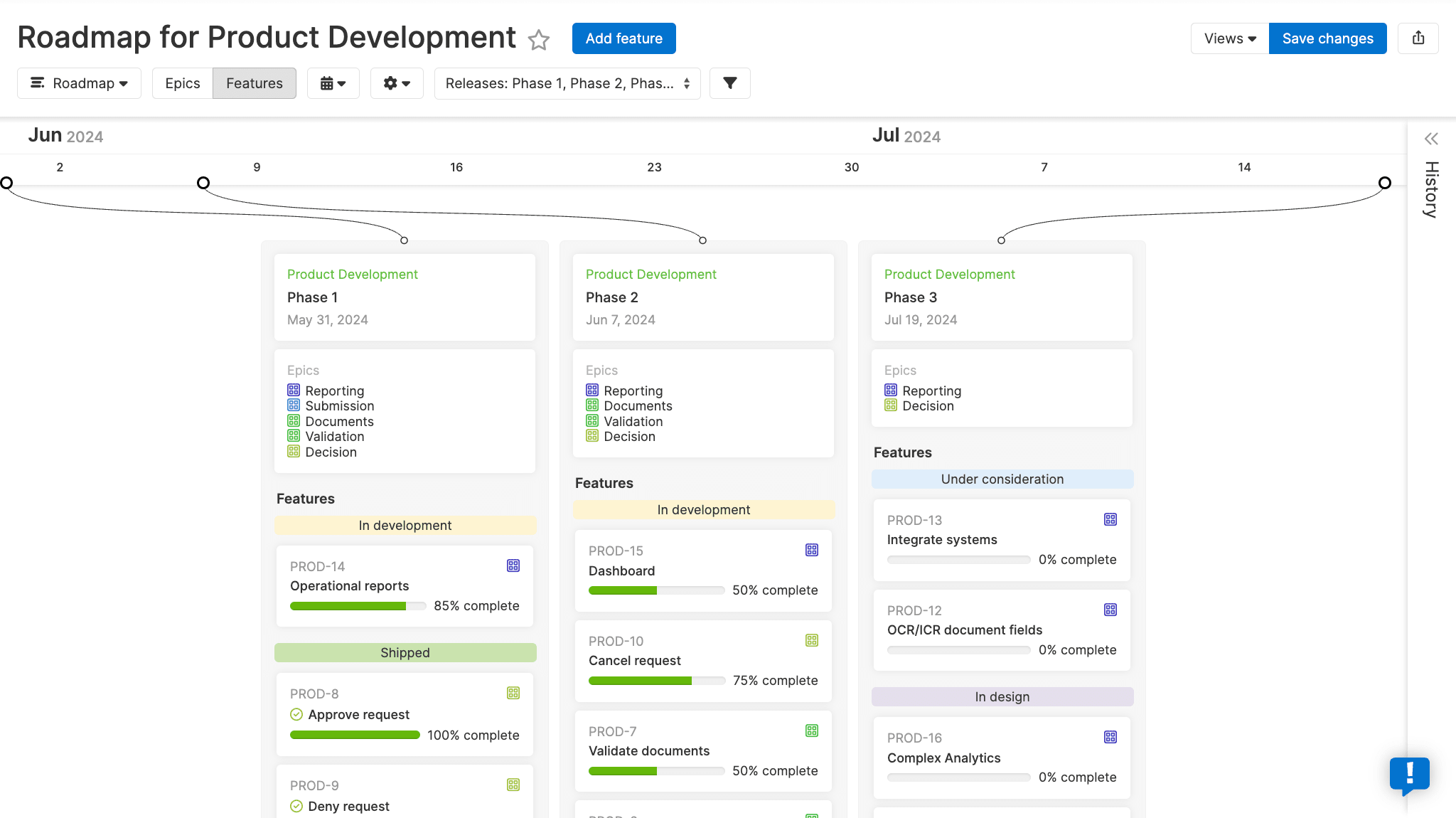
Aha! is a comprehensive product development software suite designed to help teams plan, build, and launch products effectively. It offers a range of roadmapping, idea management, and agile development tools, enabling product managers to align strategy with execution throughout the product lifecycle.
Key features of Aha!
- Visual roadmaps with customizable views and easy sharing options
- Product idea management and customer feedback collection
- Sprint planning and agile development tools with integrations to popular platforms
- Robust strategy-to-execution alignment capabilities
- Extensive customization options to fit specific project team needs
- Comprehensive suite of tools covering the entire product development process
Aha! Roadmaps pricing
- Premium: From $59/user/month
- Enterprise: From $99/user/month
- Enterprise+: From $149/user/month
Optional upgrades to Aha! Roadmaps:
- Aha! Ideas: $20/user/month
- Aha! Whiteboards: $9/user/month
- Aha! Knowledge: $20/user/month
- Aha! Develop: $18/user/month
Read more about Aha’s plans and pricing
Aha! ratings and reviews
Compare: Aha! vs. Jira, Aha! Alternatives, Best Product Roadmap Software
5. ClickUp
Best for: Organizations of various sizes — from small businesses to large enterprises — seeking extensive customization and feature-rich tools for maximum flexibility in project management
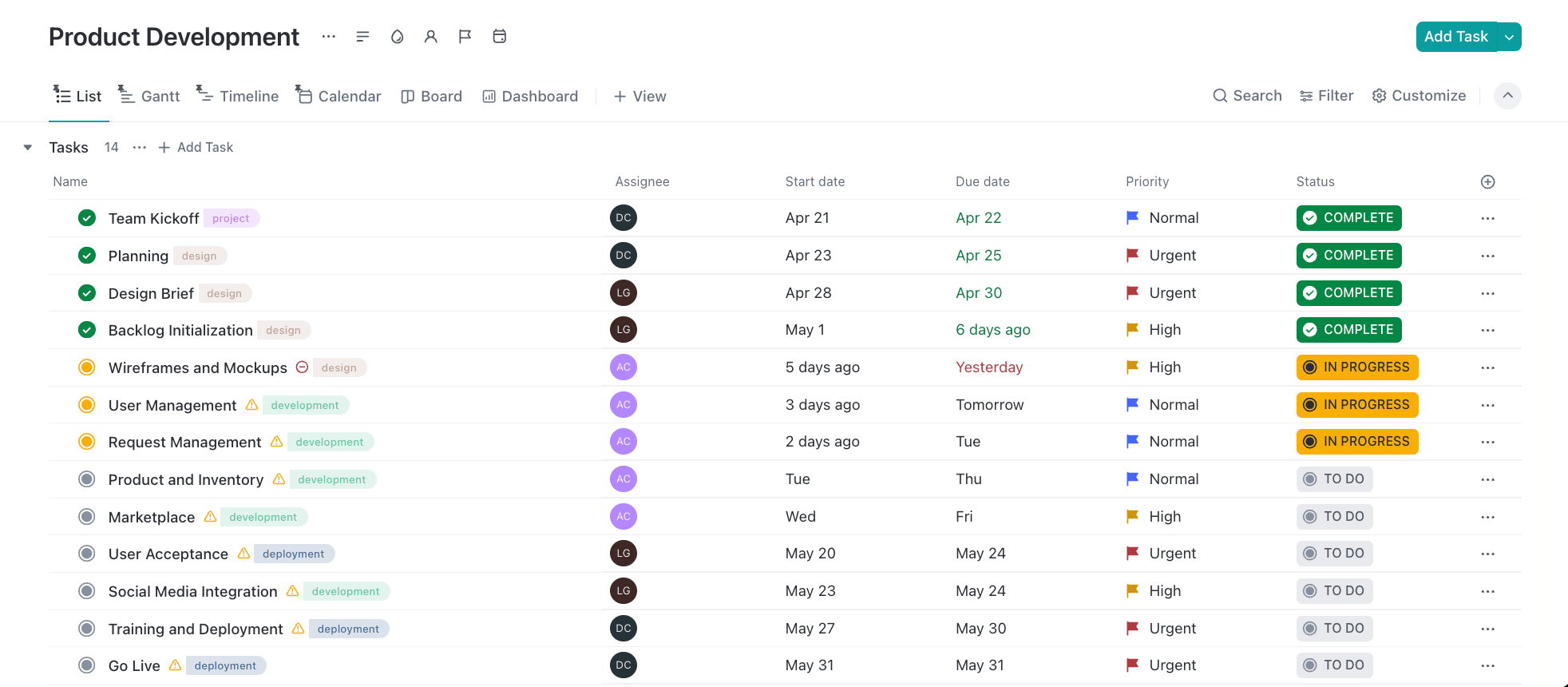
ClickUp is a comprehensive product management and development platform combining robust planning tools and agile methodologies. It offers a centralized workspace for product teams to strategize, track progress, and collaborate throughout the product lifecycle.
Key features of ClickUp
- Product roadmapping with customizable views and timeline planning
- Agile sprint planning and backlog management tools
- Git integration for code tracking and version control
- Adaptable to various product development methodologies (Agile, Scrum, Kanban)
- Powerful custom fields and statuses to tailor workflows to specific product needs
- Comprehensive reporting and analytics for product performance tracking
ClickUp pricing
- Free: Basic features for unlimited users
- Unlimited: From $7/user/month
- Business: From $12/user/month
- Enterprise: Custom pricing
Read more about ClickUp’s plans and pricing.
ClickUp ratings and reviews
Compare: ClickUp vs. monday.com, ClickUp vs. Trello, ClickUp vs. Asana, ClickUp Alternatives
6. Productboard
Best for: Product managers, product owners, and cross-functional product teams in organizations of all sizes looking for a centralized system to manage the product development process
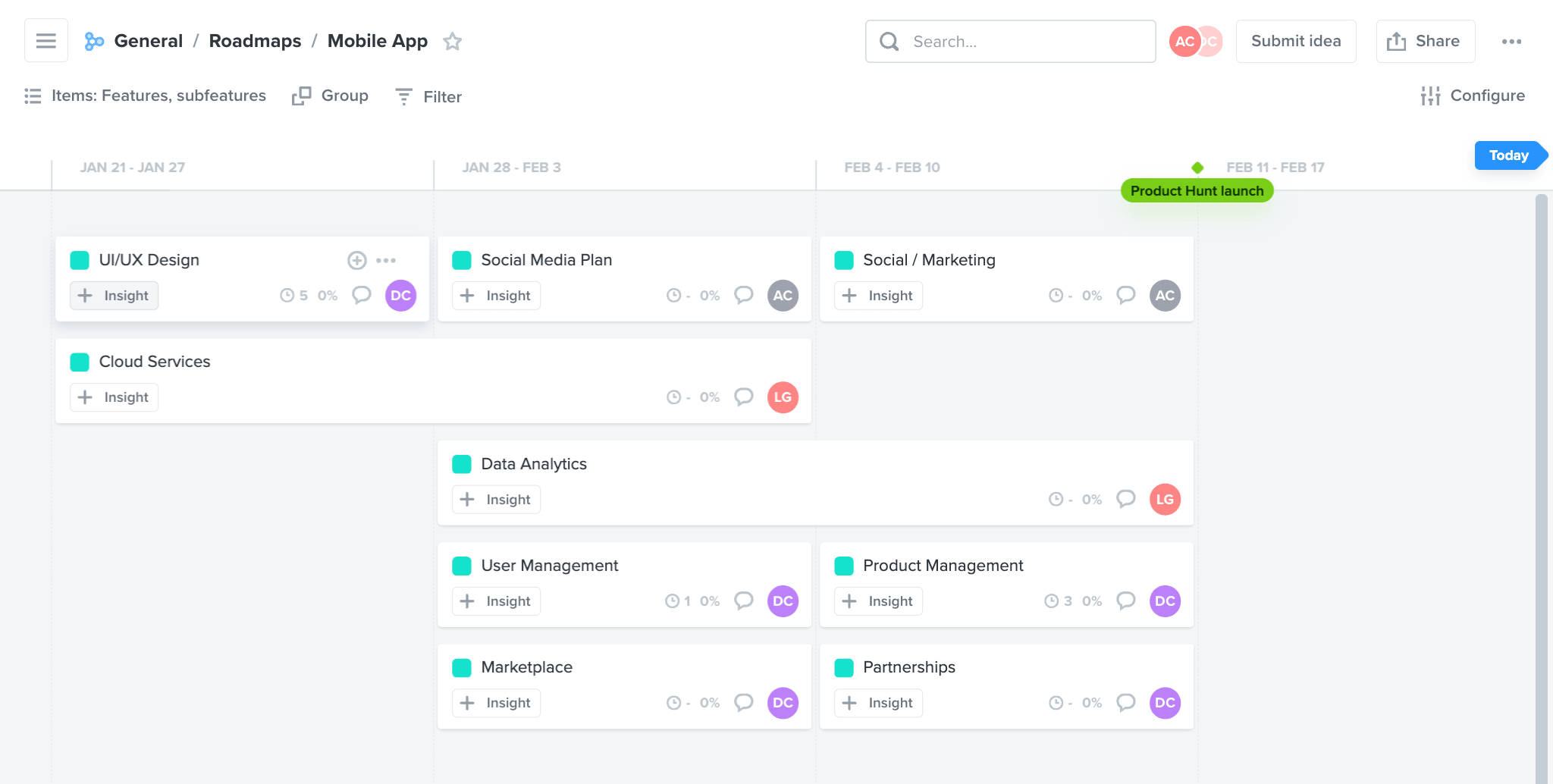
Productboard is a customer-centric product management platform designed to help teams understand user needs, prioritize features, and align stakeholders around the product roadmap. It offers a comprehensive suite of tools for the entire product lifecycle, from discovery to delivery, enabling product managers to make data-driven decisions and bring products to market faster.
Key features of Productboard
- Centralized feedback management with insights collection from multiple sources
- Feature prioritization based on user impact and strategic drivers
- Dynamic roadmapping with customizable views for different audiences
- Strong focus on customer feedback and user-centric product development
- Flexible and customizable to fit various product management methodologies
- Comprehensive integration capabilities with other product development tools
Productboard pricing
- Starter: Free for everyone
- Essentials: From $19/maker/month
- Pro: From $59/maker/month
- Enterprise: Custom pricing
Productboard ratings and reviews
Compare: Best Product Roadmap Software
7. Craft.io
Best for: Product managers, product owners, and cross-functional product teams in organizations of all sizes looking for a centralized system to manage the entire product development process
Craft.io is an end-to-end product management platform designed to help teams strategize, prioritize, and execute product development throughout the entire lifecycle. It offers a comprehensive suite of tools for product managers to make informed decisions, align stakeholders, and bring products to market faster.
Key features of Craft.io
- Strategic roadmapping with customizable views for different audiences
- Feature prioritization using scoring matrices and alignment with company objectives
- User story mapping and backlog management with integration capabilities
- Strong focus on product strategy and alignment with business goals
- Comprehensive suite of tools covering the entire product lifecycle
- Flexible and customizable to fit various product management methodologies
Craft.io pricing
- Starter: From $19/editor/month
- Pro: From $79/editor/month
- Enterprise: Custom pricing
Craft.io ratings and reviews
8. airfocus
Best for: Product managers, project managers, and cross-functional teams in organizations of all sizes looking for a flexible and customizable product management solution
airfocus is a modular product management platform designed to help teams prioritize, plan, and execute product strategies through customizable workflows and tech stack integrations. It offers a comprehensive suite of tools for the entire product lifecycle, enabling managers to make data-driven product decisions and align stakeholders with the product roadmap.
Key features of airfocus
- Customizable prioritization frameworks with scoring matrices and alignment to company objectives
- Dynamic roadmapping with multiple views for different audiences
- Centralized feedback management with valuable insights from various sources
- Highly adaptable to various product management methodologies and team structures
- Strong focus on data-driven decision-making and strategic alignment
- Comprehensive integration capabilities with popular development tools like Jira and Azure DevOps
airfocus pricing
- Core: From $59/editor/month
- Scale: Custom pricing
- Enterprise: Custom pricing
airfocus ratings and reviews
9. Airtable
Best for: Product managers, development teams, and cross-functional teams looking for a flexible and customizable solution to manage their product lifecycle and development processes.
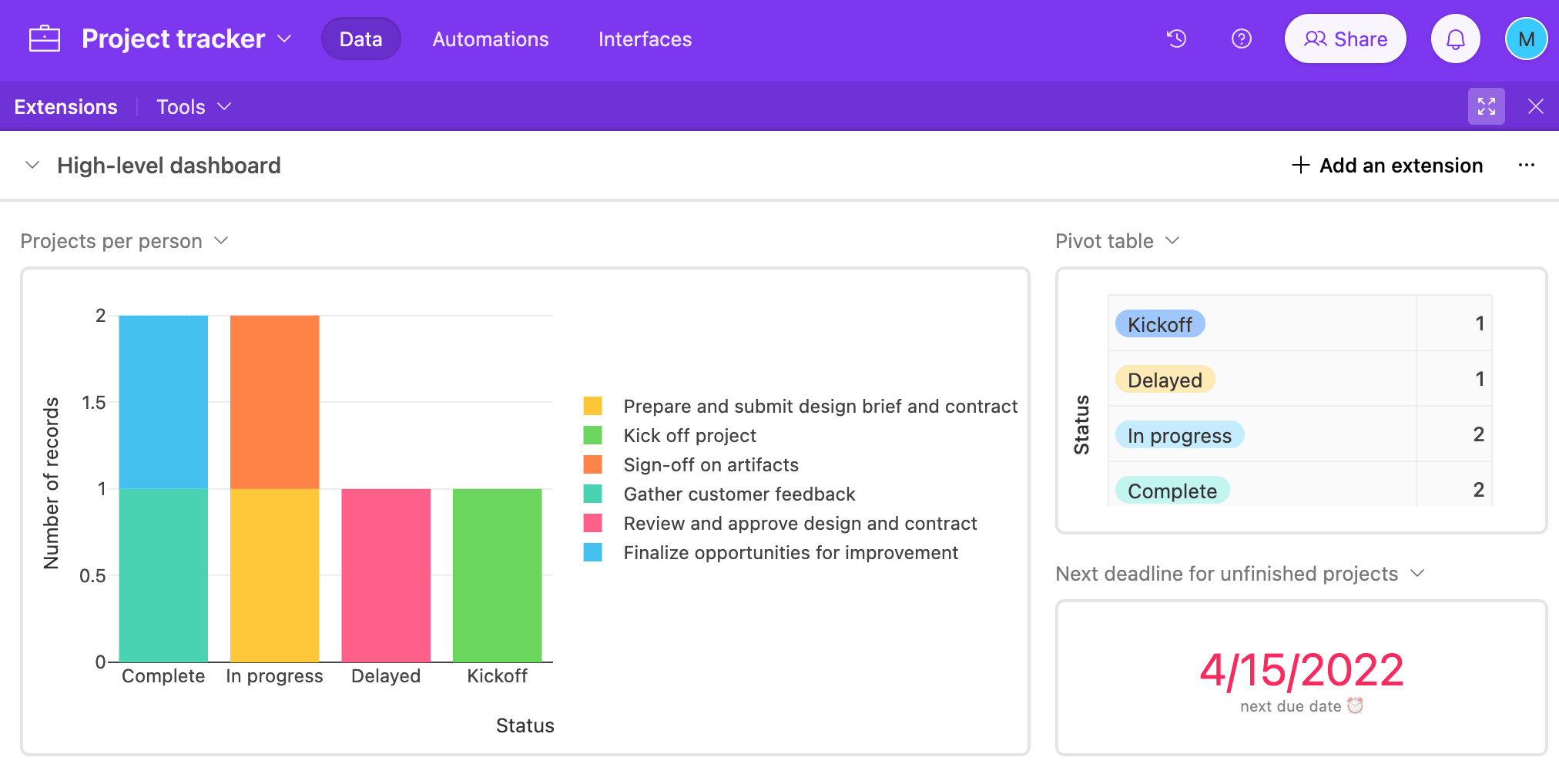
Airtable is a versatile platform that combines the simplicity of a spreadsheet with the power of a database, offering customizable tools for product management and software development. It provides a centralized workspace for teams to plan, track, and execute projects with features like customizable views, relational databases, and integrations.
Key features of Airtable
- Customizable roadmapping with multiple views for visualizing product timelines
- Centralized feedback management with AI-powered insights for customer-driven development
- Sprint planning and backlog management with the ability to link records across tables
- Adaptable to various product management methodologies with customizable fields and views
- Strong collaboration features allow real-time product updates and comments for team alignment
- Extensive integration capabilities with popular development tools and platforms
Airtable pricing
- Free: For up to 5 editors
- Team: From $20/seat/month
- Business: From $45/seat/month
- Enterprise: Custom pricing
Read more about Airtable’s plans and pricing
Airtable ratings and reviews
Compare: Airtable vs. monday.com, Airtable vs. Asana, Airtable vs. Trello, Airtable Alternatives
10. Smartsheet
Best for: Product managers, project managers, and cross-functional teams in organizations of all sizes looking for a flexible and collaborative solution to manage product development and software projects
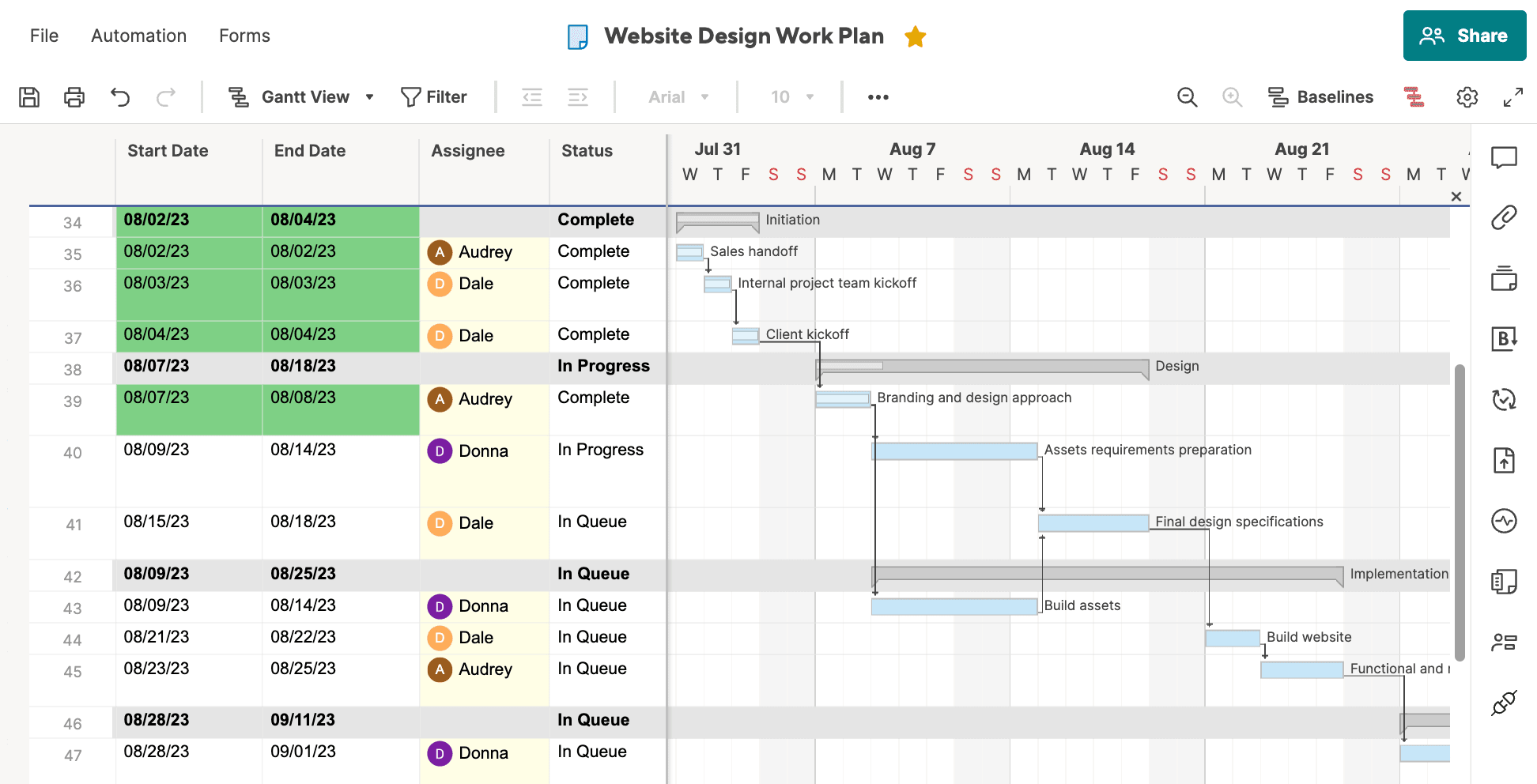
Smartsheet is a cloud-based work management platform that combines the simplicity of a spreadsheet with powerful project management, collaboration, and automation features. It enables teams to plan, track, automate, and report on work, helping organizations move from idea to impact faster.
Key features of Smartsheet
- Multiple views (Gantt, Kanban, Calendar) for visualizing product timelines
- Automated workflows and approvals to streamline product development processes
- Resource management tools for capacity planning and team allocation
- Strong integration capabilities, especially with Microsoft Teams and Office 365
- Highly customizable to fit various product management methodologies
- Robust collaboration features allowing real-time updates and comments for team alignment
Smartsheet pricing
- Pro: From $9/member/month
- Business: From $19/member/month
- Enterprise: Custom pricing
Read more about Smartsheet’s plans and pricing
Smartsheet ratings and reviews
Compare: Smartsheet vs. monday.com, Smartsheet vs. Trello, Smartsheet vs. Asana
Choosing the best ProductPlan alternative for your team
By now, you should have a clearer picture of the ProductPlan alternatives and which would work best for your team and organizational needs. When choosing an alternative, consider team size, specific feature requirements, integration capabilities, and pricing plans to find the best fit for your product team’s needs.
For instance, while ProductPlan focuses primarily on roadmapping, monday dev offers a complete suite of tools for the entire product development lifecycle. Here’s why monday dev stands out:
- Enhanced collaboration: monday dev enables engineers, leaders, and stakeholders to manage all aspects of product development in one flexible platform.
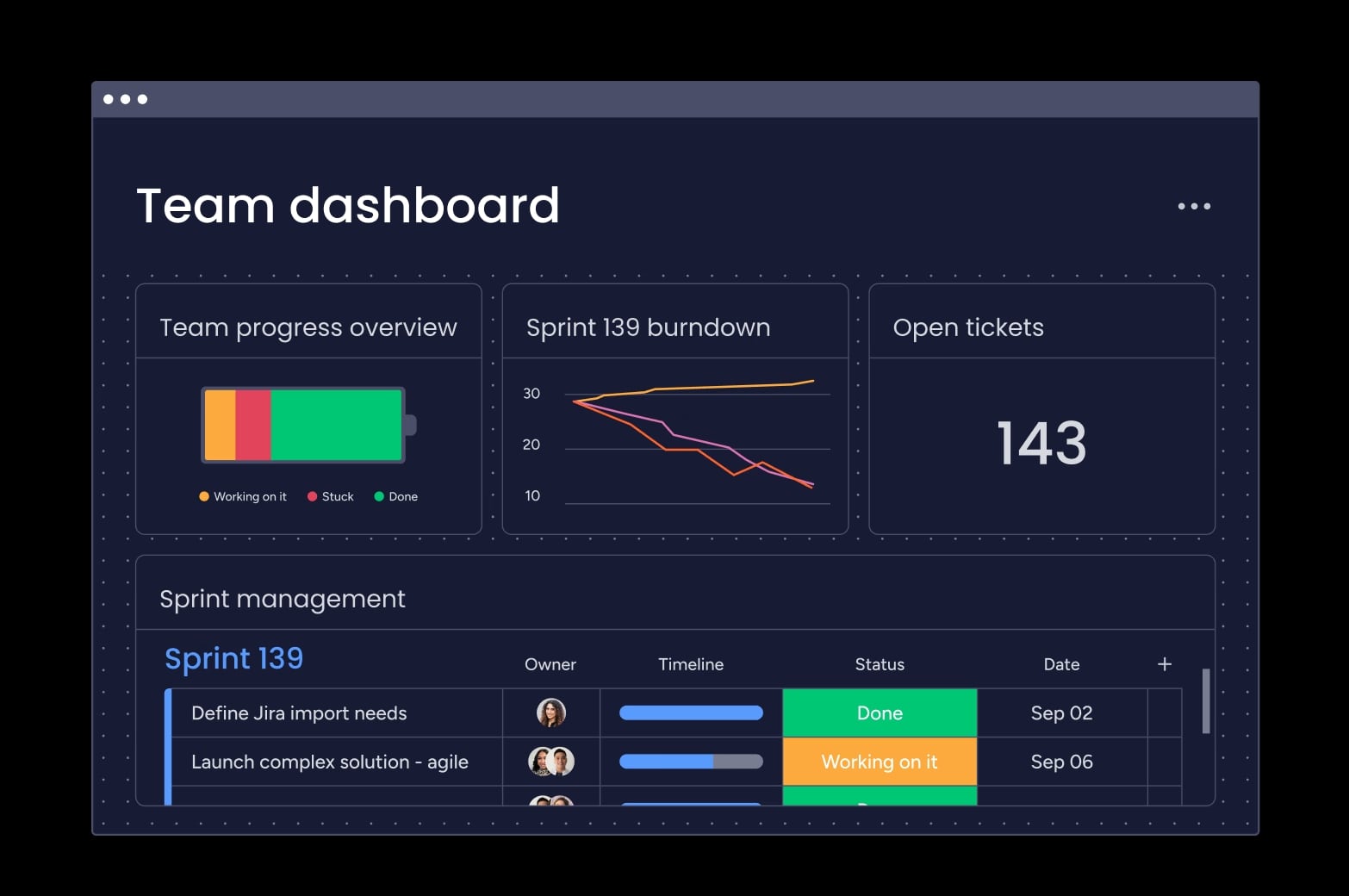
- Versatile views: monday dev offers customizable project roadmapping with multiple views — like Gantt, Kanban, and Calendar — providing greater flexibility when visualizing product timelines.
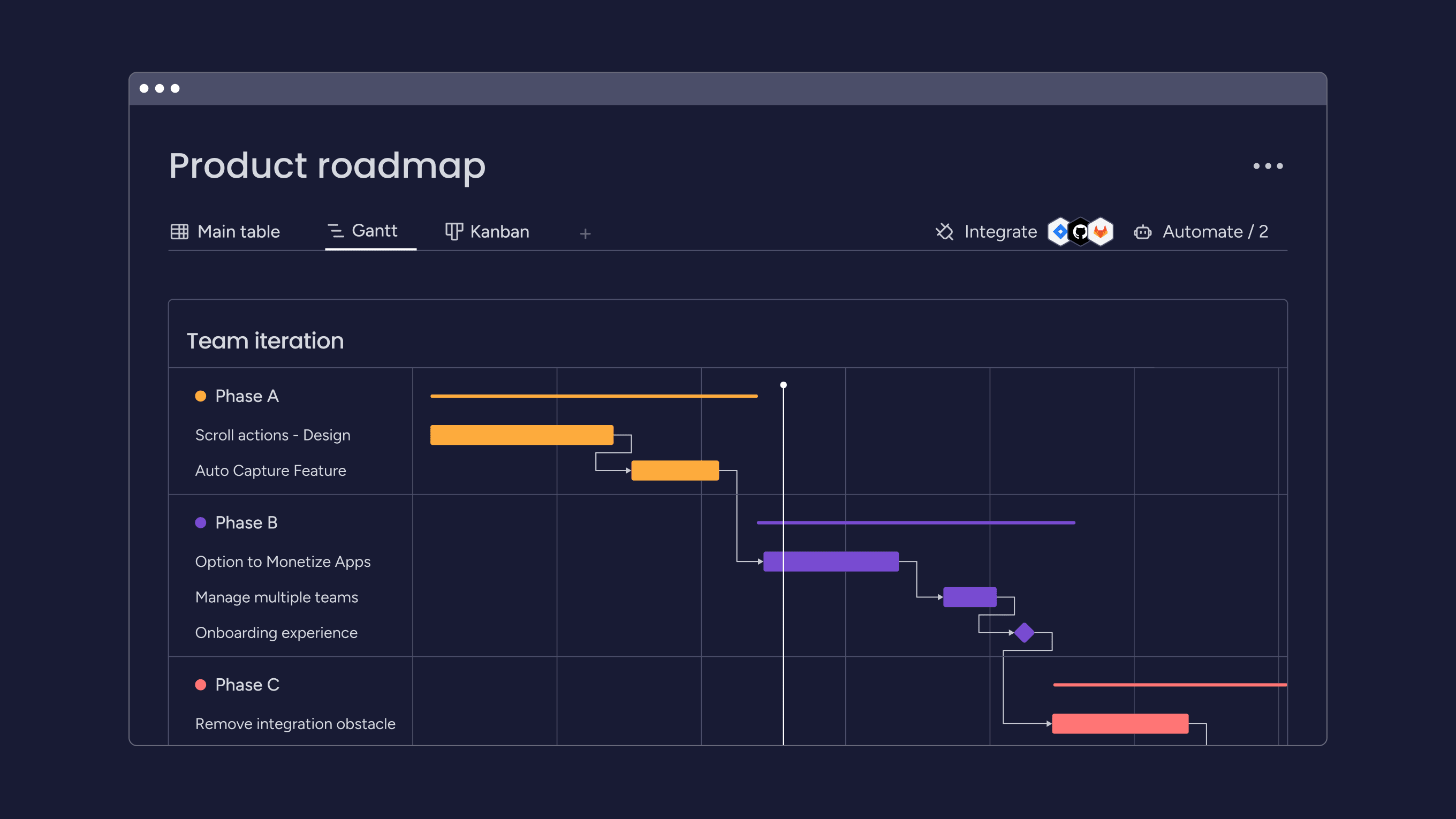
- Workload management: The platform allows managers to balance product team workloads, offering both high-level and granular data on task allocation across team members.
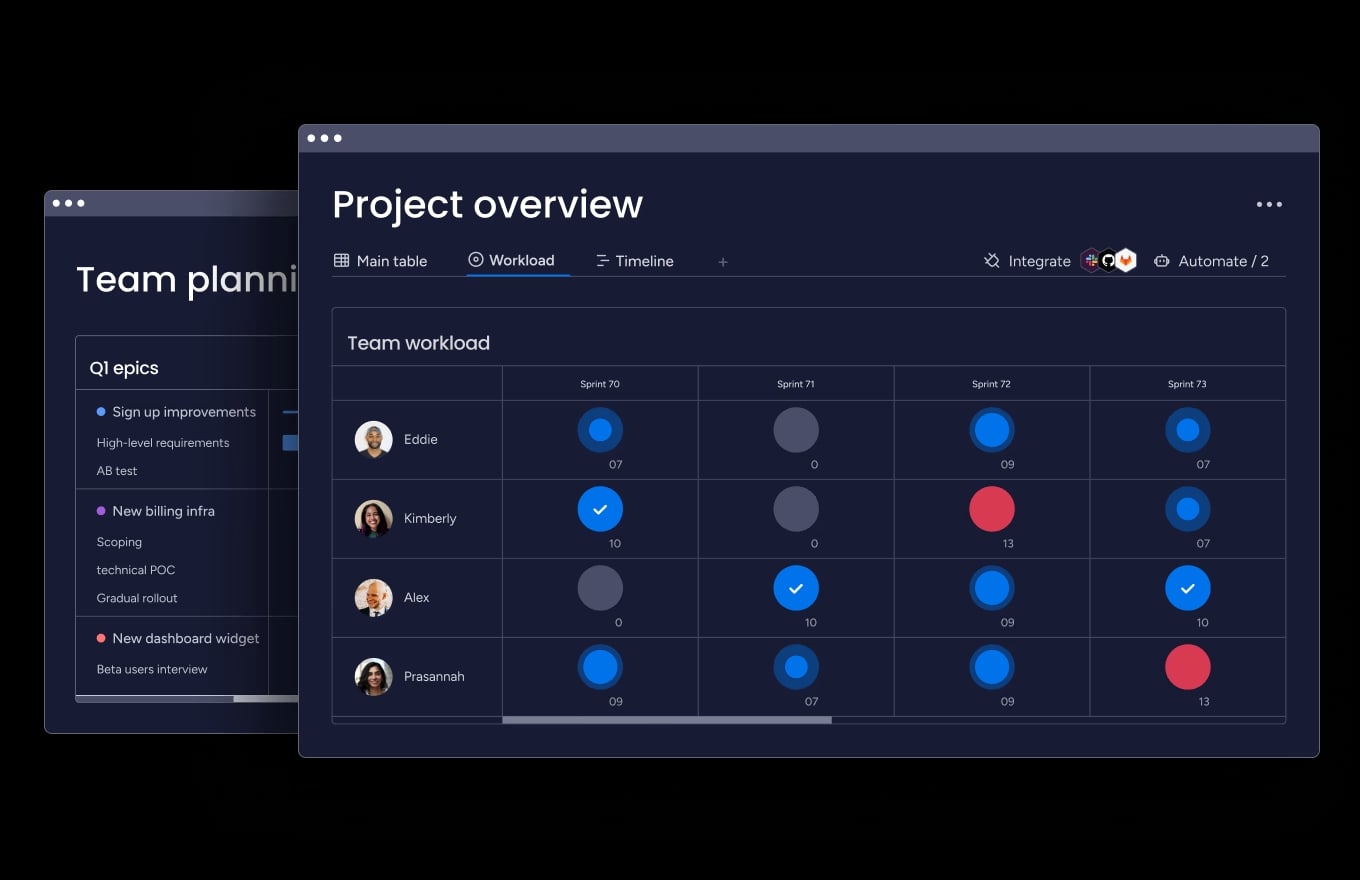
- Seamless communication: monday dev facilitates easy sharing of product plans internally and externally, ensuring all stakeholders can collaborate on a single, user-friendly platform.
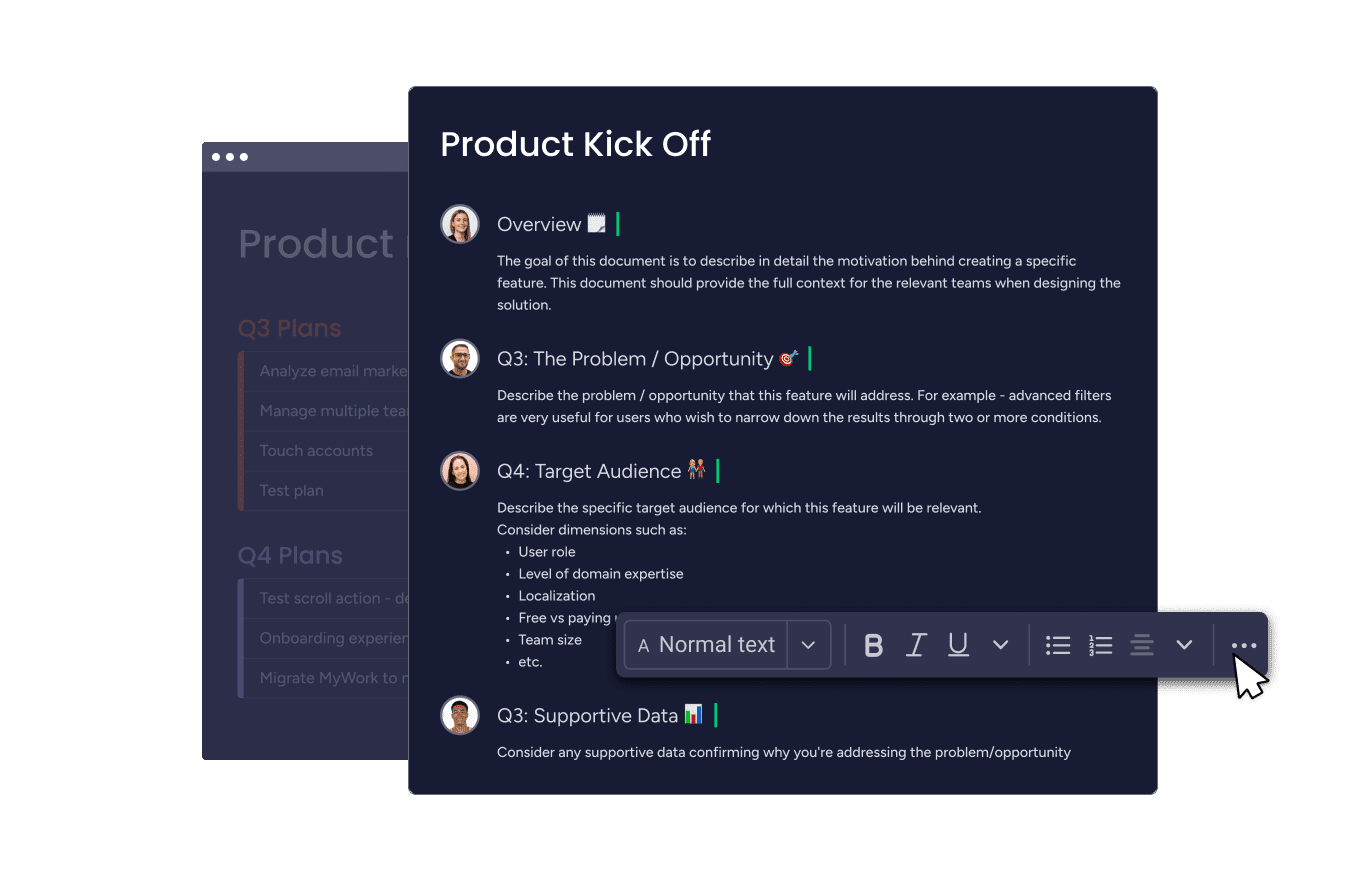
- Integration capabilities: monday dev integrates with over 200 apps and tools like GitHub to streamline the overall product management workflow.
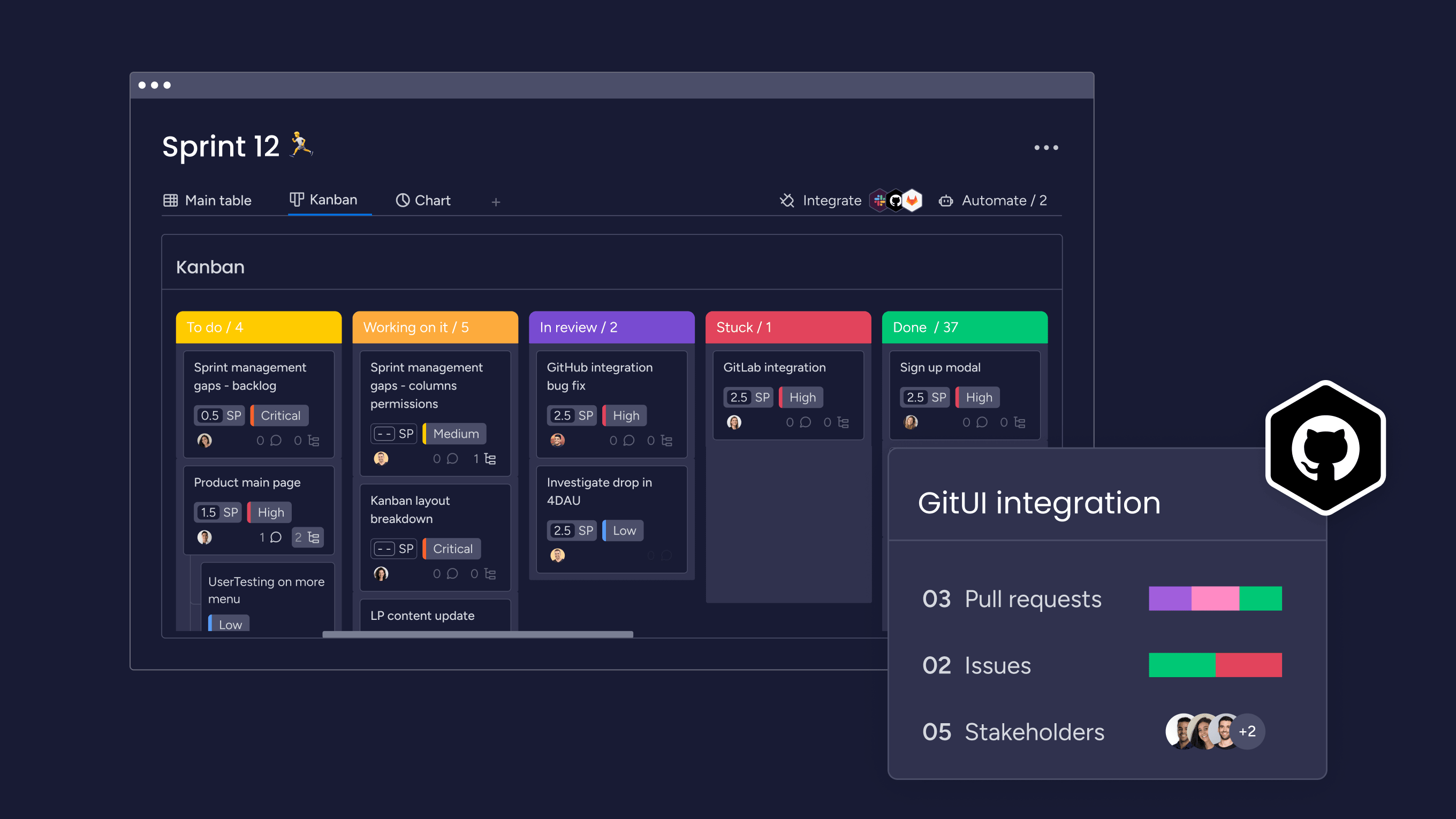
- Ease of use and support: G2 reviewers say that monday dev is easy to use, set up, and administer with excellent 24/7 customer support.
Ratings ProductPlan monday dev
Ease of use 9.1 9.1
Ease of setup 9.3 9.0
Ease of admin 8.9 9.2
Quality of support 9.3 9.4
By offering these advanced features and addressing the full spectrum of product management needs, monday dev provides a robust and versatile solution.
But don’t just take our word for it — experience monday dev yourself with a free trial and see how it compares to ProductPlan or any of the other alternatives.
Try monday devWhat is roadmapping in product management?
Roadmapping in product management is the strategic process of creating a visual plan that outlines a product's direction, goals, and development over time. It involves defining the product vision, identifying key initiatives and features, prioritizing work based on business objectives and customer needs, and organizing efforts into a timeline of releases or milestones. The resulting roadmap serves as a high-level communication tool that aligns stakeholders, guides product strategy execution, and adapts to new insights and market changes.
What is the difference between roadmapping and planning?
Roadmapping is a strategic process that outlines a product's high-level direction, goals, and major milestones over an extended period, typically focusing on the "why" and "what" of product development. On the other hand, planning is a more tactical process that deals with the specific "how" and "when" of executing the roadmap, often involving detailed task breakdowns, resource allocation, and shorter timeframes. While roadmapping provides a flexible, long-term vision that aligns stakeholders around product strategy, planning translates this vision into actionable steps and concrete deliverables.
What is product roadmap software?
Product roadmap software allows product managers and related teams to visualize, plan, and communicate their product strategy by outlining the key features, milestones, and timelines involved. It enables teams to track progress, prioritize initiatives, collaborate across departments, and share strategic plans with stakeholders in a visually appealing format. If the market changes or customer demands shift, you can update your roadmap, inform key stakeholders of any changes, and keep everyone on the same page.

